Court hearings on the criminal case against citizens of the Republic of Armenia Arayik Harutyunyan, Arkadi Ghukasyan, Bako Sahakyan, Davit Ishkhanyan, Davit Babayan, Levon Mnatsakanyan and others, who are accused of committing crimes against peace and humanity, war crimes, including the preparation and conduct of a war of aggression, acts of genocide, violation of the laws and customs of warfare, as well as terrorism, financing of terrorism, forcible seizure of power, forcible retention of power and numerous other crimes as a result of Armenia's military aggression, was continued on March 17, Report informs.
The hearings held at the Baku Military Court were presided over by Judge Zeynal Aghayev and a panel consisting of Jamal Ramazanov and Anar Rzayev (reserve judge Gunel Samadova). Each of the accused was provided with an interpreter into the language of their choice, as well as defense attorneys.
Present at the hearings were the accused persons and their defense attorneys, some of the victims, their legal successors and representatives, as well as prosecutors in charge of public prosecution.
At today’s court hearing, the accused person Levon Mnatsakanyan was asked questions by prosecutors supporting the state accusation, representatives of the victims, and defenders.
The accused person was asked questions about functions and duties within a criminal organization, the forcible seizure of power in Azerbaijan's sovereign territories formerly occupied by Armenia, including the activities of military formations and the "army" operating under the leadership and control of Armenia in the fake regime, military service regulations, the transportation and placement of weapons in the occupied territories, the granting of "ranks" in the fake regime's "army," appointments to "positions" and dismissals from "positions," approval of "staff units," allocation of finances, payment of "salaries" to military personnel in Karabakh, conducting military training and gatherings, resolving issues of military personnel responsibility, and the role and participation of the Armenian state, its state institutions, armed forces, and high-ranking officials in these processes.
He confessed that decisions regarding appointments to high positions in the "army" of the fake regime were made in Armenia. Appointments to positions of lieutenant colonel and higher ranks were made by the chief of the general staff of the Armenian armed forces, the defense minister, and the president. "As the 'commander' of the 'army,' I could only appoint positions up to and including major, and grant ranks up to major," he stated.
The accused person added that the financial issues of the fake regime's "army" were provided by Armenia's Ministry of Defense, and weapons and ammunition were fully supplied by the Armenian armed forces. He later said: "We had a supply service. The supply service received it, then it was presented to each unit. That is, the provision of weapons and ammunition was carried out by Armenia's Ministry of Defense."
In response to questions from Chief Prosecutor's Senior Assistant, Vusal Aliyev, Mnatsakanyan stated that in June 2015, he was appointed to the position of "defense minister" of the fake regime - "commander" of the "army" by Armenia's then-president Serzh Sargsyan.
The accused person stated that initially Armenia's defense minister Seyran Ohanyan submitted a recommendation regarding his "appointment" to this "position," and Sargsyan approved it.
According to Mnatsakanyan, Sargsyan received him regarding the appointment. "During the meeting, he told me that this is a very important position," the accused person added.
According to the "official information" spread by the fake regime in 2015, Levon Mnatsakanyan was supposedly appointed to the "position" of "defense minister" by the then "president" Bako Sahakyan.
While answering the questions by Tugay Rahimli, the special assignments assistant to the Prosecutor General, the accused Levon Mnatsakanyan stated that the investigation of war crimes committed by Armenian residents who served in the occupied territories and citizens of the Republic of Armenia was conducted by the Military Police of Armenia, while the preliminary investigation was carried out by the Military Prosecutor's Office of Armenia.
He responded to the operation of an entity called "Khankandi Military Police Unit of the Republic of Armenia" in the occupied territories by saying, "Such a unit existed because it was part of the same army."
Mnatsakanyan later said that criminal cases were heard in the Syunik Military Court located in Armenia.
Answering questions from state prosecutor Fuad Musayev, the accused emphasized that since the military structure was the same, military crimes committed by servicemen during their service period were investigated and decided with the same status as similar crimes in Armenia, regardless of whether they were committed against Armenian residents in occupied territories or citizens of Armenia.
Levon Mnatsakanyan stated that every year 7,000-8,000 military conscripts from Armenia were sent to Azerbaijan's occupied territories for compulsory military service.
He said that there was military conscription twice a year, and during each conscription, 3,500-4,000 Armenian citizens were brought to the occupied territories.
Mnatsakanyan further stated that approximately 70 percent of those serving in the "army" of the fictitious regime were citizens of Armenia, while the other 30 percent were Armenian residents living in the occupied territories.
The accused person later noted: "During service, no distinction was made between them, they were subject to the same command and their military uniforms were also identical."
He also mentioned that the Armenian military personnel in the occupied territories and in Armenia operated under the same charter.
While answering the questions by State prosecutor Vusal Abdullayev, Mnatsakanyan also talked about binoculars being brought from abroad: "It was in 2015, or before that, I don't remember exactly, binoculars and other equipment were brought to Armenia from America or somewhere else. Later they prohibited bringing them directly. Those aids would arrive at the Armenian Ministry of Defense's base, and then they would be distributed."
Mnatsakanyan said that there were no weapons such as "Iskander M," "Tochka U" and “Smerch” in Azerbaijan’s occupied territories
Additionally, responding to state prosecutor Tarana Mammadova's questions, he noted that during his tenure as the "defense minister" of the self-proclaimed regime, as well as before and after, he did not see these weapons in the occupied territories.
The accused person also answered prosecutors' questions about who gave the order to rocket attack civilians in Ganja, Barda, and other areas, saying that such firing orders could be given by the chief of the general staff of the Armenian armed forces. When asked, "If the chief of general staff could give an order, with whom in the country's leadership would he need to coordinate before giving the order?" Mnatsakanyan replied, "During wartime, the chief of general staff reports to one person, the head of the country."
When asked, "Who is considered the head of the country in Armenia?" the accused person answered, "In Armenia, it's the Prime Minister. At that time, the Chief of the General Staff was Onik Gasparyan, and the Prime Minister was Nikol Pashinyan."
He said that the probability of those missiles deviating from the target was approximately 5-10 meters. To the prosecutor's question, "In your opinion, during the 44-day war, was the killing of civilians in Ganja, Barda and other areas the result of missiles deviating from their targets, or were the targets deliberately chosen?" he answered: "If it happened several times, it's clear what it is. If it's once, it's an accident; if it's several times, it's not an accident... I don't know."
Mnatsakanyan said that during his time in the "position" of "defense minister" in the so-called regime, he did not report any changes, reforms, or events to the regime's "president."
"There could have been general contacts, nothing else. I reported to the general staff of the Armenian armed forces," he stated.
The accused person stated that during the April battles that took place in 2016, he also reported to the general staff of the Armenian armed forces and did not provide any information to the "leadership" of the so-called regime in Karabakh.
Mnatsakanyan noted that the development plan for the "army" in the so-called regime and other documents were presented by the chief of the general staff of the Armenian armed forces and approved by the Armenian leadership, while the "president" of the so-called regime had no authority regarding this matter.
The accused person admitted in his testimony that during the 44-day war in 2020, he was in an artillery unit in the combat zone in the direction of Talish village and the south on the orders of Arayik Harutyunyan. "I came and said that lawlessness prevails there, it's a mess," he added.
He also admitted that mines were brought to Karabakh from Armenia and stated: "Anti-personnel mines were produced in Armenia."
Later, documents belonging to Levon Mnatsakanyan were examined. The state prosecutor stated that Mnatsakanyan's testimony in court was confirmed by the examination of documents in Armenian.
In his answers to questions, he also stated that he has known Ruben Vardanyan since approximately 2005-2008.
The next court hearing is scheduled for April 3. In the next process, the accused persons will be questioned.
A total of 15 Armenian nationals are being charged with numerous crimes involving direct leadership and participation of the Armenian state, its state bodies, military forces and illegal armed formations, verbal and written instructions, orders and assignments, provision of material and technical support, central governance, as well as the exercise of rigorous control, with the aim of committing military aggression and acts of terror against the Republic of Azerbaijan in the territory of Azerbaijan in violation of domestic and international law, and involving Robert Sedraki Kocharyan, Serzh Azati Sargsyan, Vazgen Mikaeli Manukyan, Vazgen Zaveni Sargsyan, Samvel Andraniki Babayan, Vitali Mikaeli Balasanyan, Zori Hayki Balayan, Seyran Mushegi Ohanyan, Arshavir Surenovich Garamyan, Monte Charles Melkonyan and others, including criminal acts committed during the course of the war of aggression waged by the aforementioned criminal group.
The said persons, i.e. Arayik Vladimiri Harutyunyan, Arkadi Arshaviri Ghukasyan, Bako Sahaki Sahakyan, Davit Rubeni Ishkhanyan, David Azatini Manukyan, Davit Klimi Babayan, Levon Henrikovich Mnatsakanyan, Vasili Ivani Beglaryan, Erik Roberti Ghazaryan, Davit Nelsoni Allahverdiyan, Gurgen Homeri Stepanyan, Levon Romiki Balayan, Madat Arakelovich Babayan, Garik Grigori Martirosyan, Melikset Vladimiri Pashayan, are being charged under Articles 100 (planning, preparing, initiating and waging a war of aggression), 102 (attacking persons or organizations enjoying international protection), 103 (genocide), 105 (extermination of the population), 106 (enslaving), 107 (deportation or forced displacement of the population), 109 (persecution), 110 (enforced disappearance of people), 112 (deprivation of liberty contrary to international law), 113 (torture), 114 (mercenary service), 115 (violation of the laws and customs of warfare), 116 (violation of international humanitarian law during armed conflict), 118 (military robbery), 120 (intentional murder), 192 (illegal entrepreneurship), 214 (terrorism), 214-1 (financing terrorism), 218 (creation of a criminal association (organization)), 228 (illegal acquisition, transfer, sale, storage, transportation and possession of weapons, their components, ammunition, explosives and devices), 270-1 (acts threatening aviation security), 277 (assassination of a state official or public figure), 278 (forcible seizure and retention of power, forcible change of the constitutional structure of the state), 279 (creation of armed formations and groups not provided for by law) and other articles of the Criminal Code of the Republic of Azerbaijan.
A court hearing is ongoing at the Baku Judicial Complex in connection with the criminal case against individuals accused of committing war crimes against Azerbaijan.
According to Report, the proceedings are being led by Judge Zeynal Aghayev of the Baku Military Court.
During the previous session, the accused responded to prosecutors' questions regarding specific incidents.
A total of 15 individuals are charged in the case. These are Arkadiy Gukasyan, Arayik Harutyunyan, Bako Saakyan, David Ishkhanyan, David Babayan, Leva Mnatsakanyan, David Manukyan, Garik Martirosyan, Melikset Pashayan, Davit Allahverdyan, Gurgen Stepanyan, Levon Balayan, Madat Babayan, Vasiliy Beglaryan, and Erik Ghazaryan.
According to the periods of participation in the criminal organization, these individuals are charged under the following articles of the Criminal Code of Azerbaijan:
- Article 100 (Planning and waging aggressive war)
- Article 102 (Attacks on persons or organizations enjoying international protection)
- Article 103 (Genocide)
- Article 105 (Extermination of population)
- Article 106 (Slavery)
- Article 107 (Deportation or forced relocation of population)
- Article 109 (Persecution)
- Article 110 (Forced detention of a person)
- Article 112 (Deprivation of liberty in violation of international law)
- Article 113 (Torture)
- Article 114 (Mercenary activity)
- Article 115 (Violation of laws and customs of war)
- Article 116 (Violation of international humanitarian law during armed conflicts)
- Article 118 (Military robbery)
- Article 214 (Terrorism)
- Article 214-1 (Financing terrorism)
- Article 218 (Creation of a criminal community (organization))
- Article 228 (Illegal acquisition, transfer, sale, storage, transportation, or possession of weapons, parts for weapons, ammunition, explosives, or explosive devices)
- Article 270-1 (Threats to aviation security)
- Article 278 (Violent seizure of power or violent retention of power, violent change of the constitutional order of the state)
- Article 279 (Creation of armed formations or groups not envisaged by legislation).
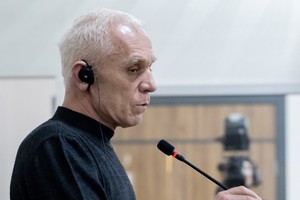
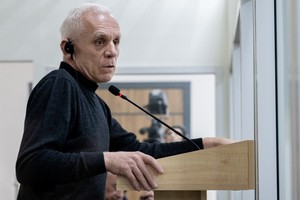
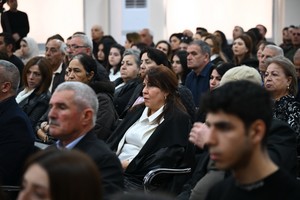
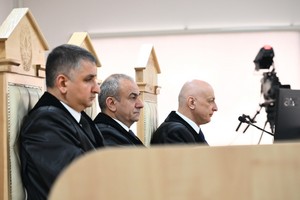
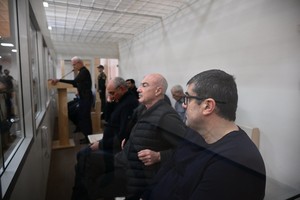
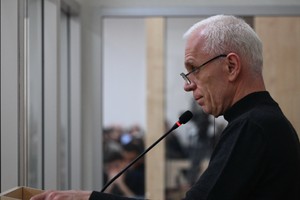
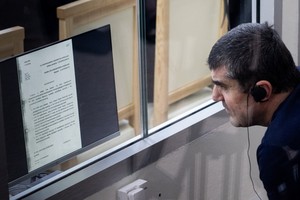
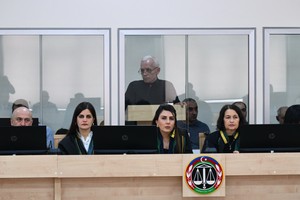
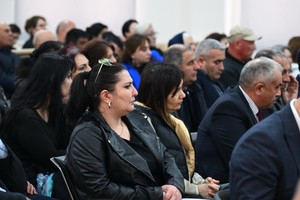
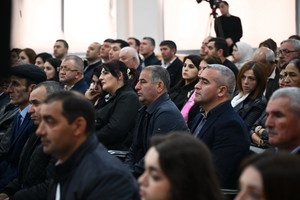
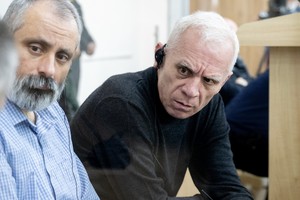
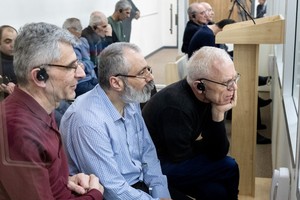
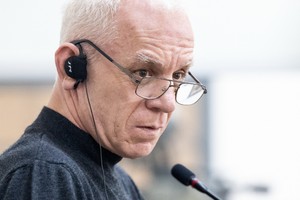
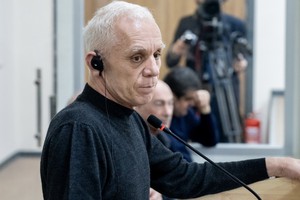
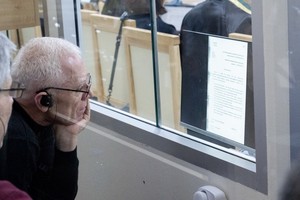
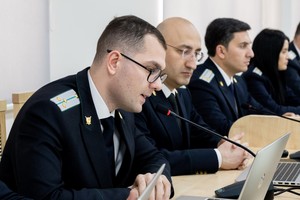
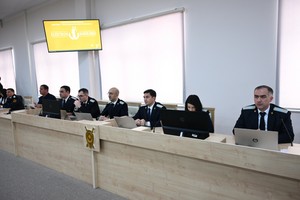
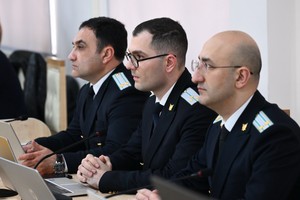
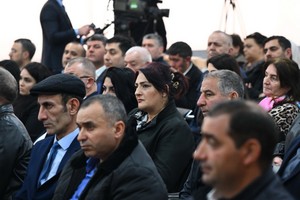
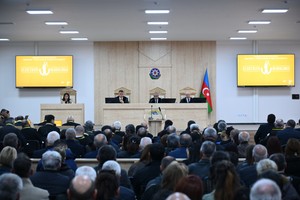


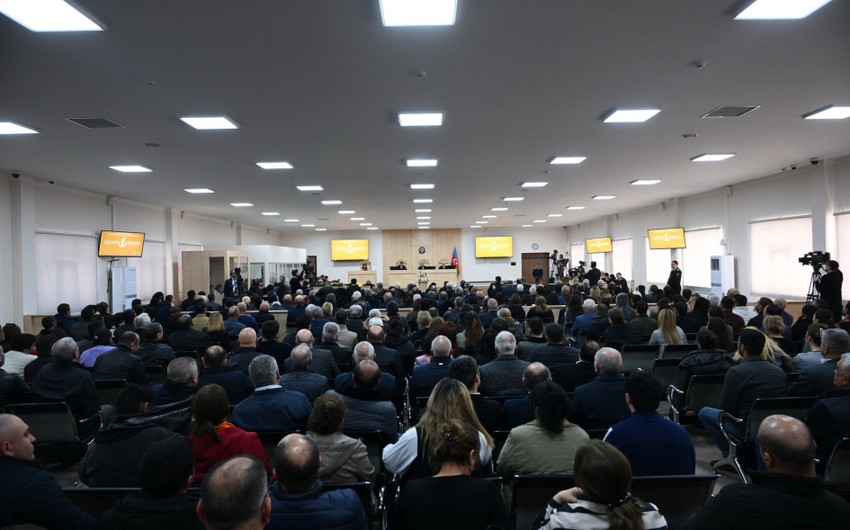 https://images.report.az/photo/fb1aff86-87fd-3e23-bc68-ecb8592386f3.jpg
https://images.report.az/photo/fb1aff86-87fd-3e23-bc68-ecb8592386f3.jpg

